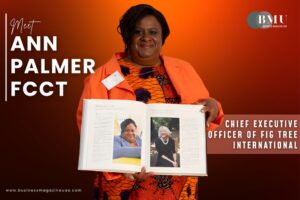
We recently had the privilege of having an insightful conversation with Flavia Shaw-Jackson, Founder and Executive Director of FACE for Children in Need, a child protection NGO based in Egypt. After witnessing the tragic conditions of abandoned children, Flavia felt a strong need for an organization that could create a meaningful change for such children. With FACE, she works on child-centred solutions, protecting the most vulnerable children and ensuring they grow up in safe environments. With a diverse range of programs at FACE, Flavia Shaw-Jackson is not only protecting children but restoring their dignity and future as well.
The Beginning of an Inspirational Journey
We started the session by asking, “How did your professional journey in the humanitarian field begin, and what key moments or experiences have shaped your work today?”
Flavia shared, “My journey into the humanitarian field began with a moment of heartbreak and deep awakening. After watching the BBC documentary – The Dying Rooms, which exposed the tragic fate of abandoned children in Chinese orphanages, I felt an overwhelming need to act and to find a way to reduce the suffering of vulnerable children.
In 2003, I travelled to Cairo to gain firsthand insight into the realities facing children living on the streets or in institutions. I chose Cairo as I had young children and it was feasible for me to do regular trips. I met with ministry officials, local experts, and visited numerous slums and care facilities. The need for action and support was undeniable and I felt I could bring my energy to create something meaningful for these children.
I compiled my findings into a report and developed a business plan, which laid the groundwork for founding FACE. From the very beginning, I held a strong conviction: institutional care, no matter how well-intentioned, is not the solution. Children need the love, stability, and support of a family to truly thrive. That belief has remained at the heart of everything we do at FACE, and it continues to shape our vision, our programs, and our commitment to building long-term, child-centered solutions.”
A Leader for Child Protection
With a strategic vision and a commitment to protect the vulnerable children, Flavia Shaw-Jackson built FACE. Interested to learn more about her organization’s support, we asked, “Can you tell us more about your current role and the mission of FACE for Children in Need?”
“I am the Founder and Executive Director of FACE, a child protection NGO working in Egypt since 2003. Our mission is to protect the most vulnerable children, abandoned children, street children, and those at risk to ensure they grow up in safe and caring environments.
My role is to lead our strategic vision, support our teams in Egypt, and advocate with government and international partners to create systemic, sustainable change in child protection and alternative care,” she mentioned.
What Sets FACE Apart: An Impactful Approach
We further asked Flavia to share more about the core programs or services her organization provides, and what makes her approach unique or impactful.
Flavia Shaw-Jackson explained, “At the heart of FACE’s work are four core programs, each one designed not just to protect children, but to restore their dignity, hope, and future. Our Street Children Program has reached over 40,000 children since 2007, meeting them where they are, often in the most dangerous and forgotten corners of Cairo, and offering them safety, medical and psychological care as well as a path back to society through outreach, rehabilitation and reintegration into education, jobs, society and their families or extended families.
The National Family Reintegration and Kafala Program has helped nearly 900 children return to what every child needs most: a loving family. While our Training Program has empowered professionals in institutions or in the Ministry of Social Solidarity in child protection since 2010, equipping them with the tools and heart needed to safeguard vulnerable children across Egypt. And, our Aftercare Program, launched in 2022, supports youth who have grown up in care and couldn’t be placed into Kafala families. FACE gives them a chance to build a future with confidence: through education, vocational training, mentorship, and transitional housing, helping them become responsible adults in society.
What makes FACE unique is our strong ethical foundation: child protection, family-based care, transparency, and professionalism are not just values at FACE, they are the foundation of everything we do. Our mission goes beyond providing direct services, we collaborate closely with government institutions to improve child protection systems and ensure long-term, sustainable impact. Through years of dedicated advocacy and technical support, we’ve contributed to meaningful policy reform, including the 2015 amendment to the Egyptian Child Law, which lowered the legal age for Kafala placement from two years to three months. This change gives abandoned babies the chance to bond with a family from the earliest possible moment.”
“In 2014, we formally proposed a National Strategy for Alternative Care to the Ministry of Social Solidarity, which included the creation of a centralized Kafala system and a Higher Committee for Kafala, which was officially approved, marking a pivotal step toward systemic change in Egypt’s child protection landscape. FACE further worked on new simplified procedures for Kafala families as well as working with the MOSS on the criteria for the approval of families.
Grounded in extensive field experience and international best practices, a National Kafala Center opened in 2024 in collaboration with the MOSS and was only made possible with the support of Mr Mohamed Alabbar and Emaar Misr. It represents not just a project, but a powerful step forward in Egypt’s journey toward deinstitutionalization. We are also currently opening a large Kafala Unit in the MOSS offices in Cairo as a centralised office for families to come to for advice and information as well as training, psychological and legal support and a Kafala Hotline, hoping it to be instrumental in improving the Kafala system as it moves forward,” she added.
Navigating through Challenges
Leading a non-profit organization can come with its own set of challenges. To learn how Flavia Shaw-Jackson overcame the same, “What major challenges have you encountered in leading an NGO, and how have you addressed or navigated them?”
Flavia Shaw-Jackson responded, “A major challenge has been reshaping societal and institutional beliefs about orphanages. Institutionalization is still deeply rooted in many cultures, including in Egypt. Advocacy, policy reform, and evidence-based success stories have helped change that narrative
Another key challenge is ensuring the long-term financial sustainability of FACE, securing funding and managing annual budgets, hiring qualified staff, providing training, and maintaining quality at scale. Unlike many other NGOs, we have not allocated a budget for marketing, as we have always prioritized directing every possible resource towards the children’s immediate needs. We do now, however, urgently need support for the sustainability of our care for children. We believe the time has come to begin building greater awareness. We need to share our story, our mission, and the reality behind Kafala in Egypt, so that more people can understand, and help us continue what we’ve started.”
Impact of AI in Child Protection
Digital transformation is redefining businesses across industries, and it has expanded its operations to the humanitarian sectors as well. To gather Flavia Shaw-Jackson’s perspective on this, we asked, “How do you see technology including tools like Artificial Intelligence, supporting or transforming the humanitarian and child protection sector?”
Flavia Shaw-Jackson reflected, “Technology, and AI in particular, holds great potential to enhance the efficiency and reach of humanitarian and child protection efforts. It can support rapid research, streamline the creation of educational materials, translate documents in real time, and improve overall communication and coordination. These advancements can help raise awareness, optimize resource use, and reduce operational costs.
However, in the field of child protection, technology must remain a supportive tool, not a replacement. At the heart of this work are human relationships: trust, empathy, and emotional connection. No algorithm can replicate the warmth, safety, and sense of belonging that a child experiences through genuine human care. Technology can help us do our work better, but it can never replace the people who make children feel truly seen, heard, and valued.”
Envisioning the Future
We further asked, “What is your vision for the future of child protection and alternative care in Egypt and beyond?”
“Our vision is clear: no child should grow up in an institution. Every child has the right to a family and a future. Egypt has made tremendous progress including a national plan to close orphanages in the future. Our work now focuses on strengthening Kafala, improving the system, supporting local families, and ensuring the system is prepared to take this bold step. Internationally, I hope more countries embrace family-based care as the gold standard and move away from outdated institutional models.
Looking ahead, I carry a new dream: to open a dedicated center for children who have suffered abuse, a safe space where they can heal, rebuild, and be protected immediately,” she added.
Words of Wisdom for Beginners
We requested Flavia Shaw-Jackson to share some insights for aspiring changemakers or professionals looking to create lasting social impact through non-profit work.
Flavia Shaw-Jackson shared, “Social change takes time and often needs quiet persistence. You do not need to be a professional to make a difference, though my studies in business certainly have helped. It is always important to be respectful of local cultures, traditions, and religions. You do need to be able to think strategically while staying grounded in practical realities.
You need to stay passionate, be determined, and stay committed over the years, even through the intense stress it can bring. A clear plan is also needed to try and inspire and align diverse teams, partners, and stakeholders. Team building and conflict resolution are frequent. I definitely feel that integrity and strong ethics are key to working in the humanitarian field. Donors trust you with their money and you need to strongly commit to making sure funds are spent for the children’s benefit with maximum financial transparency and professionalism. Most important is humility and being able to listen to others and learn from them and from mistakes you make.”
Follow Flavia Shaw-Jackson on LinkedIn or email flavia@facechildren.org for more.
Find FACE on LinkedIn and visit their website www.facechildren.org
Also Read :-
Connecting People with Authentic and Unfiltered Narratives: Abeer Nammari
Layal Abou Ghanem, OD Leader and Co-Founder of STC: Driving People-Centered Excellence







